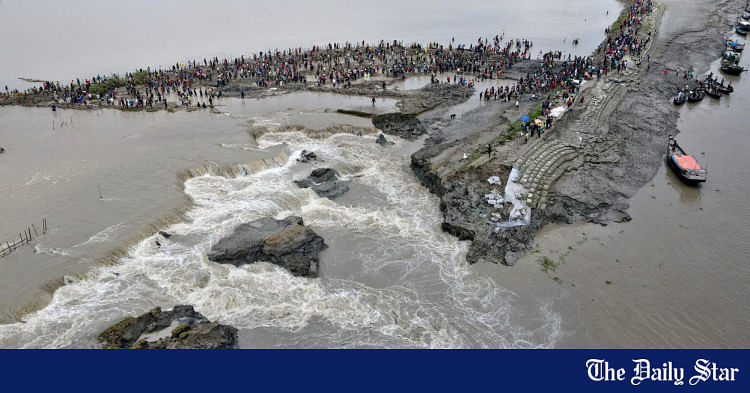The World Meteorological Organization specifically notes that South Asia will experience continued heavy rainfall through 2029, threatening countries where climate disasters already displace millions annually. FILE PHOTO: HABIBUR RAHMAN
“>
The World Meteorological Organization specifically notes that South Asia will experience continued heavy rainfall through 2029, threatening countries where climate disasters already displace millions annually. FILE PHOTO: HABIBUR RAHMAN
As Bangladesh stands at the crossroads of democratic renewal, every established and emerging party has articulated its vision for change for various issues from judicial independence to educational overhaul. Yet, one critical omission in this reform conversation that renders all other reforms meaningless if left unaddressed is climate resilience.
The World Meteorological Organization’s (WMO) latest Global Annual to Decadal Climate Update, released on May 28, should wake up every political leader in Bangladesh. Global temperatures are predicted to be between 1.2 and 1.9 degrees Celsius higher than pre-industrial levels for each year between 2025 and 2029, with an 86 percent chance that temperatures will exceed the critical 1.5 degrees Celsius threshold for at least one year in this period. For Bangladesh, these findings pose existential threats. Bangladesh ranks ninth worldwide for climate disaster risk, facing a brutal combination of sea level rise, temperature increases, floods, cyclones, droughts, and storm surges. Even Dhaka is sinking at nearly 12 millimetres per year due to excessive groundwater extraction according to a Scroll.in article. The WMO specifically notes that South Asia will experience continued heavy rainfall through 2029, threatening countries where climate disasters already displace millions annually.
While these climate realities intensify, our capacity to adapt is being undermined by youth unemployment. According to the International Labor Organization’s (ILO) latest report, Bangladesh’s youth unemployment rate continues to be more than double the national rate, with university graduates hit hardest. With unemployment rising to 4.63 percent in fiscal 2024-25’s second quarter, we have a generation of educated young people with no economic prospects in an increasingly climate-threatened nation. These crises of climate vulnerability and youth unemployment aren’t separate issues; they demand one integrated response: green jobs and climate-resilient livelihoods.
Political parties preparing manifestos for upcoming parliamentary elections need to stop treating climate change as just another environmental issue separate from economic development. In Bangladesh, climate adaptation can support economic development. Building flood-resistant infrastructure creates construction jobs. Developing climate-smart agriculture employs farmers and agricultural technicians. Installing renewable energy systems requires skilled workers and ongoing maintenance. Green entrepreneurship is essential for survival. We need leaders who will actually connect our youth with climate-focused education and green livelihoods. This means real investments in climate-smart agriculture, renewable energy infrastructure, sustainable urban planning, and disaster-resilient construction. It means training programmes that teach young Bangladeshis to lead clean energy transitions, design flood-resistant homes, develop drought-resistant crops, and create early warning systems for extreme weather.
In a climate-vulnerable country like Bangladesh, digital skills must be climate-focused. We need data scientists who can model flood patterns, app developers who can create disaster response platforms, and engineers who can design climate-resilient infrastructure. Important leadership skills for 2025 and beyond in Bangladesh are climate intelligence, climate literacy and climate awareness. Leaders should understand that every policy decision, from urban planning to food production, from industrial development to educational curricula, must be seen through the lens of climate resilience.
Here’s the truth no politician wants to face: no reform will work when the basic requirement for all human activity, a liveable country, no longer exists. Judicial independence means nothing if courts are regularly dealing with extreme heat and flooding. Economic growth is pointless if industries keep getting destroyed by cyclones and droughts. Educational reforms won’t matter if schools are constantly damaged by climate disasters. Democratic institutions can’t function if millions of climate refugees are always on the move.
Young Bangladeshi voters are looking for leaders who can handle climate change that affects youths’ ability to find meaningful work, live in decent cities, and build actual lives. This should be reflected in manifestos that put green infrastructure first, promise renewable energy transitions over fossil fuel dependence, invest in climate education, and create green.
The choice for Bangladesh’s political leadership is simple: adapt to meet the climate challenge or become irrelevant as climate reality takes over. Young Bangladeshis, educated, unemployed, and very aware of their climate vulnerability, won’t support leaders who don’t get this basic truth.
Climate resilience isn’t just another item on the reform list; it’s what makes all other reforms possible. Until our political parties grasp this, they’re not offering real leadership. They’re just offering different versions of ignoring reality. The choice is between climate-smart politics and climate-blind politics. We need to make that choice now.
Ejaj Ahmad is the founder and CEO of the Global Youth Leadership Center and the founder and executive chairperson of the Bangladesh Youth Leadership Center.
Views expressed in this article are the author’s own.
Follow The Daily Star Opinion on Facebook for the latest opinions, commentaries and analyses by experts and professionals. To contribute your article or letter to The Daily Star Opinion, see our guidelines for submission.




